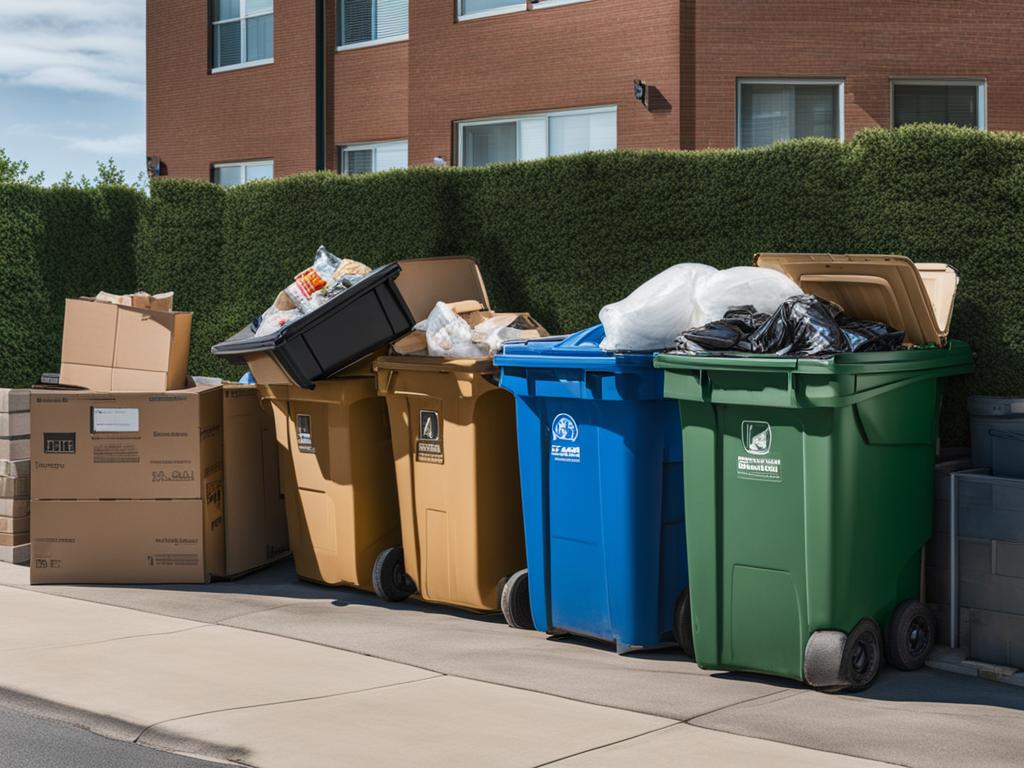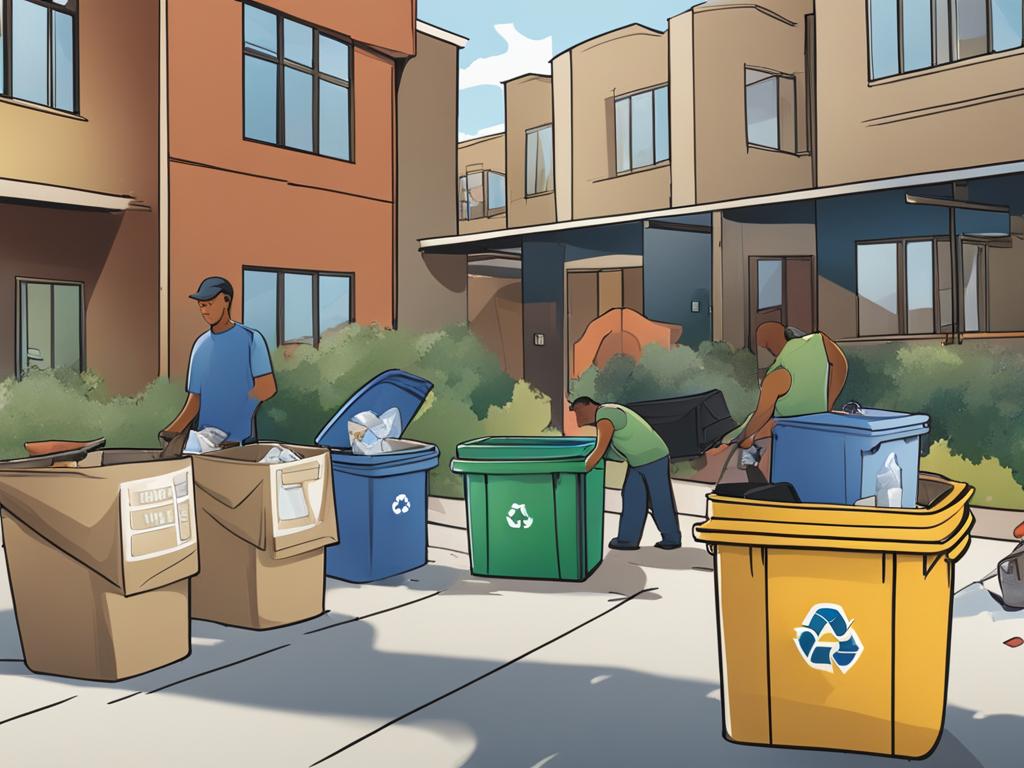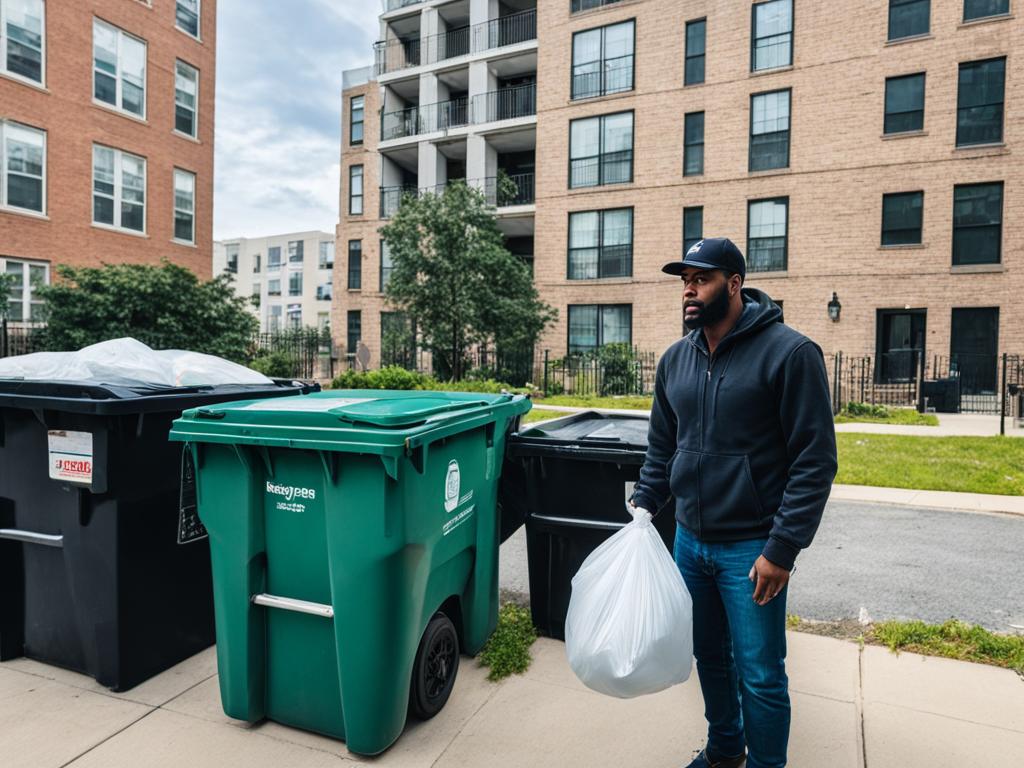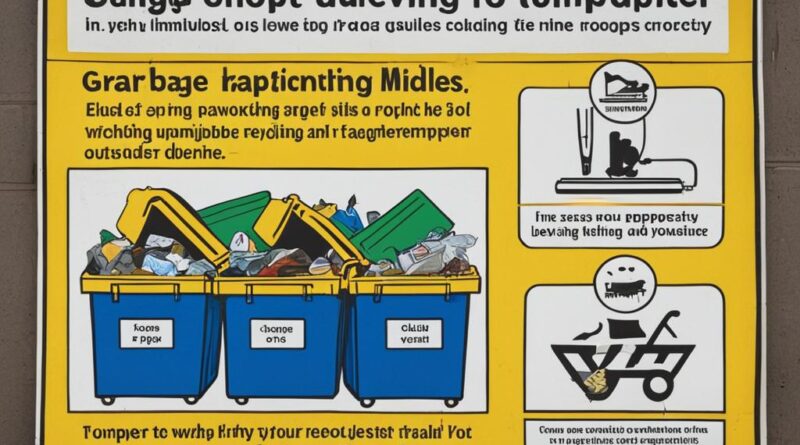Apartment Dumpster Etiquette: Must-Know Rules
When it comes to proper disposal of trash in apartments, following the rules is essential for apartment waste management and to maintain a clean living environment. Understanding the guidelines for apartment dumpster etiquette will help you navigate the do’s and don’ts of waste disposal.
Key Takeaways:
- Properly disposing of trash in apartments is crucial for waste management and cleanliness.
- Familiarize yourself with specific apartment dumpster rules set by your apartment manager and waste disposal company.
- Know what items are allowed in the apartment dumpster, such as food scraps, food-soiled paper, and broken glass.
- Special pick-ups can be scheduled for large items that don’t fit in the dumpster.
- Avoid disposing of prohibited items like hazardous waste and electronic waste in the apartment dumpster.
What Goes in the Dumpster
Knowing what items are acceptable for disposal in the apartment dumpster is essential. By following apartment waste regulations and adhering to apartment trash guidelines, you can ensure proper waste management and maintain a clean living environment. Here are some general dumpster etiquette guidelines for residents:
- Food Scraps: Dispose of leftover food, vegetable peels, and expired perishable items in the dumpster.
- Food-Soiled Paper: Items like greasy pizza boxes, used napkins, and paper plates with food residues can be discarded in the dumpster.
- Diapers: Wrap soiled diapers tightly before disposing of them in the dumpster.
- Pet Waste: Scoop pet waste into a bag and tie it securely before throwing it away in the dumpster.
- Plastic Utensils: Clean plastic utensils, such as forks, spoons, and knives, can be disposed of in the dumpster.
- Aseptic Containers: Empty aseptic containers, such as milk cartons and juice boxes, are generally accepted in the dumpster.
- Broken Glass: Wrap broken glass in multiple layers of newspaper or place it in a sturdy bag before disposing of it in the dumpster.
While these items are generally allowed in the dumpster, it’s crucial to verify the specific guidelines with your apartment manager and waste disposal company. They may have additional regulations or restrictions in place.
| Accepted Items | Not Accepted Items |
|---|---|
| Food Scraps | Hazardous Waste |
| Food-Soiled Paper | Medical Waste |
| Diapers | Paint |
| Pet Waste | Oil and Oil Filters |
| Plastic Utensils | Batteries |
| Aseptic Containers | CFL and Fluorescent Bulbs |
| Broken Glass | Hot Ashes |
| Electronic Waste | |
| Ink Cartridges | |
| Dead Animals |
Special Pick-Ups
Apartment living often comes with limited space, and sometimes, large items may not fit into the apartment dumpster. In such cases, it’s important to know the guidelines for special pick-ups to ensure proper disposal of these items.
If you find yourself with large furniture or appliances that need to be disposed of, don’t worry. Most waste disposal companies offer pick-up services specifically for these situations. Simply reach out to them in advance to schedule a pick-up.
To make the process smoother, it’s a good idea to check with your apartment manager to see if they can assist with scheduling or provide any additional guidance. They will be able to let you know if there are any specific protocols or requirements for arranging special pick-ups.
Remember, large items such as furniture and appliances should never be left outside the dumpster or in common areas. Improper disposal can lead to cluttered spaces and inconvenience for your neighbors. By following the proper guidelines for special pick-ups, you can ensure a seamless and respectful waste disposal process.

| Guidelines for Special Pick-Ups | |
|---|---|
| 1. | Schedule a pick-up with the waste disposal company in advance. |
| 2. | Check with your apartment manager for assistance or additional guidance. |
| 3. | Ensure large items such as furniture and appliances are not left outside the dumpster or in common areas. |
Prohibited Items
When it comes to apartment waste regulations and apartment garbage disposal rules, it’s essential to understand which items are strictly prohibited from being disposed of in the apartment dumpster. Proper disposal methods should be followed to ensure the safety and well-being of residents and the environment.
Prohibited Items:
- Hazardous waste
- Medical waste
- Paint
- Oil and oil filters
- Batteries
- CFL and fluorescent bulbs
- Hot ashes
- Electronic waste
- Ink cartridges
- Dead animals
Note: The disposal of these items in the apartment dumpster is not only against apartment waste regulations but can also pose serious health and environmental risks. It’s important to dispose of these items through proper channels and resources provided by your local municipality or waste management services.
Remember, adherence to apartment waste regulations and apartment garbage disposal rules is crucial in maintaining a clean and safe living environment for all residents. By following the proper disposal methods, you contribute to a sustainable and harmonious community.
| Prohibited Items | Reason for Prohibition |
|---|---|
| Hazardous waste | Chemical hazards that can harm human health and the environment |
| Medical waste | Potential biohazards that can spread infectious diseases |
| Paint | Harmful chemicals that require specialized disposal methods |
| Oil and oil filters | Pollutants that can contaminate soil and water sources |
| Batteries | Contain toxic substances that can leach into the environment |
| CFL and fluorescent bulbs | Contain mercury, which can be harmful if released into the environment |
| Hot ashes | Potential fire hazards that can cause damage to the property |
| Electronic waste | Contains valuable and hazardous materials that require proper recycling methods |
| Ink cartridges | Contain harmful chemicals that require proper disposal to prevent pollution |
| Dead animals | Potential health risks and unsanitary conditions |
Recycling Guidelines
Proper recycling is crucial for effective waste management in apartments. Waste Management provides comprehensive information on the items that can be recycled, including metals, paper/cardboard, glass, and plastics. When recycling, be on the lookout for the recycle symbol and terms such as CA CRV, CA Cash Refund, or CA Redemption Value on the packaging or containers of your items.

Here is a breakdown of the various materials that can be recycled in apartment complexes:
| Material | Recycling Guidelines |
|---|---|
| Metals | Aluminum cans, steel cans, empty aerosol cans, foil |
| Paper/Cardboard | Newspapers, magazines, cardboard boxes, paper packaging, office paper |
| Glass | Clear, green, and brown glass bottles and jars (labels are acceptable) |
| Plastics | Plastic bottles, containers, tubs, lids, and caps (check for recycling numbers) |
Remember to rinse out containers before recycling them, remove any metal or plastic caps, and flatten any cardboard boxes to save space. Sorting your recyclables into the correct bin or in accordance with your apartment complex’s recycling policy will help ensure that the recycling process is efficient and effective.
Being Considerate to Neighbors
In addition to following the apartment dumpster rules, it’s crucial to be considerate of your neighbors in apartment living. By practicing proper apartment etiquette, you can foster a harmonious community and create a pleasant living environment for everyone.
Noise Control
Being mindful of noise levels is essential in apartment living. When entering or exiting the building, try to be soft-spoken and avoid slamming doors. Inside your apartment, keep the volume of music, television, and other devices at a minimum, especially during late hours or early mornings. This will ensure a peaceful atmosphere for yourself and your neighbors.
Laundry Room Etiquette
Respecting on-site laundry etiquette is important for a smooth experience. Be mindful of the time your laundry is in use, promptly remove your clothes from the machines once they are finished, and keep the laundry area clean. This consideration will help your neighbors use the facilities efficiently and maintain a pleasant environment for all.
Parking Etiquette
Respecting parking rules is crucial in apartment complexes with limited parking spaces. Follow any assigned parking regulations and park in designated areas only. Avoid parking in spots reserved for visitors or residents with disabilities. By being considerate of others’ parking needs, you contribute to a fair and orderly parking system within the apartment community.
Assisting Elderly Neighbors
Offering assistance to elderly neighbors when needed is a kind gesture that promotes a sense of community. Whether it’s helping them carry groceries, offering to bring in their mail or packages, or simply providing a friendly conversation, small acts of kindness can go a long way. By being considerate of your elderly neighbors, you create a supportive and caring environment within the apartment community.
Remember, apartment etiquette and respecting your neighbors are essential to creating a harmonious living environment. By following these guidelines and being considerate in your actions, you contribute to a positive community atmosphere.

“In every community, there is work to be done. In every nation, there are wounds to heal. In every heart, there is the power to do it.” – Marianne Williamson
Conclusion
In conclusion, maintaining community harmony in apartments is crucial for creating a peaceful and enjoyable living environment. By following apartment dumpster rules and practicing good etiquette, you can contribute to a harmonious community where everyone feels comfortable and respected.
One important aspect of apartment living is waste disposal. By being mindful of proper waste management, including using the apartment dumpster correctly and following recycling guidelines, you can help create a cleaner and healthier living space for yourself and your neighbors.
Additionally, respecting your neighbors is essential in fostering a positive community atmosphere. Being considerate of noise levels, following parking rules, and offering assistance to others when needed all contribute to a harmonious living experience in apartments.
By implementing these apartment living tips and maintaining community harmony, you can ensure that your apartment complex is a pleasant place to live, fostering a sense of unity and respect among residents. Remember, small actions can make a big difference in creating a positive living environment for everyone.
FAQ
What are the rules for apartment dumpsters?
When it comes to apartment dumpsters, it’s important to follow the rules set by your apartment complex. These rules may vary, but they generally include guidelines for what can and cannot be disposed of in the dumpster, as well as proper waste management practices.
What items are allowed to be thrown in the apartment dumpster?
Acceptable items for disposal in the apartment dumpster usually include food scraps, food-soiled paper, diapers, pet waste, plastic utensils, aseptic containers, and broken glass. However, it’s essential to check with your apartment manager and waste disposal company for specific guidelines.
How can I dispose of large items in my apartment complex?
If you have large items that don’t fit into the dumpster, you can usually schedule a pick-up with the waste disposal company. Contact them in advance and inquire if your apartment manager can assist with scheduling. Large items typically include furniture and appliances.
What items should never be thrown in the apartment dumpster?
There are certain items that should never be disposed of in the apartment dumpster. These include hazardous waste, medical waste, paint, oil and oil filters, batteries, CFL and fluorescent bulbs, hot ashes, electronic waste, ink cartridges, and dead animals. Proper disposal methods should be followed for these items.
Can I recycle in my apartment complex?
Recycling is an essential aspect of waste management in apartments. Waste Management provides detailed information on what can be recycled, including metals, paper/cardboard, glass, and plastics. Look for the recycle symbol and terms like CA CRV, CA Cash Refund, or CA Redemption Value on your items.
How should I be considerate to my neighbors in apartment living?
Being considerate to your neighbors in apartment living involves practicing good etiquette. This includes being soft-spoken when entering and exiting the building, keeping noise levels minimum inside the apartment, practicing on-site laundry etiquette, respecting parking rules, and offering assistance to elderly neighbors when needed.
Why is it important to follow apartment dumpster rules?
Following apartment dumpster rules and practicing good etiquette contributes to maintaining harmony within the apartment community. By being mindful of waste disposal, recycling guidelines, and respecting your neighbors, you can create a pleasant living environment for everyone.

